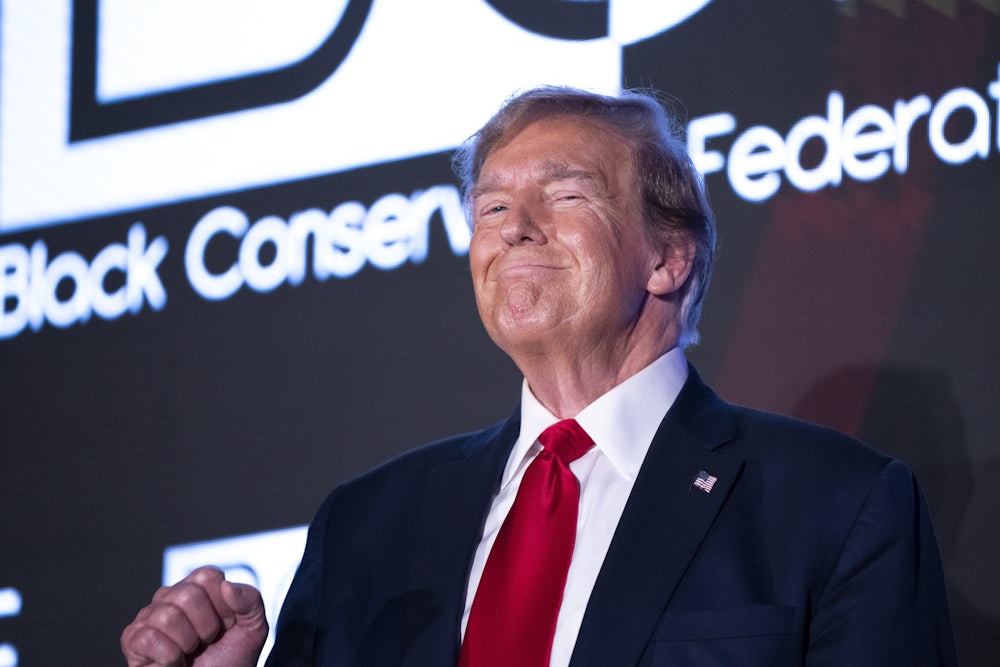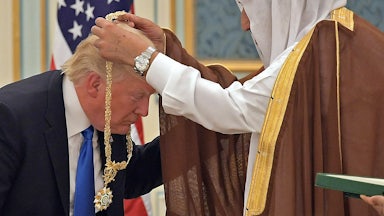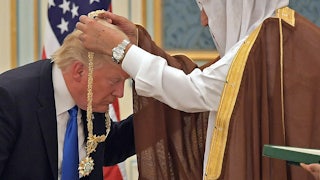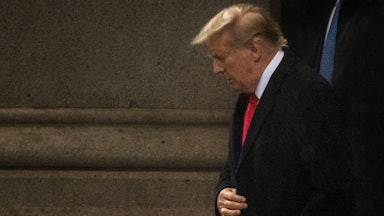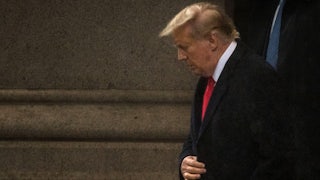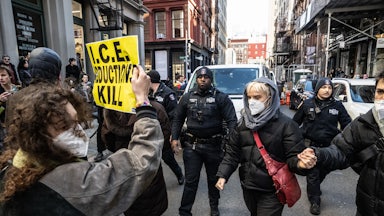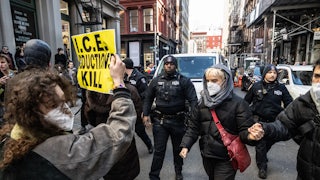The Supreme Court dropped a bombshell on Wednesday by announcing it would decide whether President Donald Trump has immunity from prosecution in the January 6 case. Just by agreeing to hear the case, the justices have already granted Trump a major victory in his quest to escape legal consequences for his actions.
In a short order announcing the decision, the justices scheduled oral arguments for April 22 and set an accelerated briefing schedule to meet it. That ensures the case will be decided at least before the court’s term is expected to end in late June. But it also all but guarantees that a trial won’t begin until the early fall. Judge Tanya Chutkan’s original timeline for the trial had set aside a few months for pretrial motions and other normal preparations.
By adopting this timeline, the Supreme Court has all but ensured that Trump’s trial won’t conclude before the November election. The assumption among many court-watchers was that the court wouldn’t take up the case at all, leaving the D.C. Circuit Court of Appeals opinion as the final word on the matter for now.
Indeed, the justices also already turned down an opportunity to rule on immunity in December when they rejected a request by the Justice Department to take up the matter before it went to the D.C. Circuit. It’s not yet known what the court was thinking behind closed doors in taking up the case like this. But there are a few possibilities, which I’ll address in order from least likely to most likely.
First, the least likely outcome is that a majority of the justices think the D.C. Circuit got it completely wrong and that a president actually does enjoy sweeping immunity for illegal acts committed while in office. There is no constitutional basis for such an immunity, and for good reason: It would transmute the office once held by George Washington and Abraham Lincoln into a vehicle for dictatorship.
During oral arguments in the D.C. Circuit Court of Appeals, Judge Florence Pan tried to probe the limits of the immunity that Trump sought. “A president could sell pardons, could sell military secrets, could order SEAL Team 6 to assassinate a political rival?” she asked one of Trump’s lawyers. “Would such a president be subject to criminal prosecution if he’s not impeached?” He responded that the president would likely be “swiftly” impeached for such an act, which was hardly reassuring.
In Wednesday’s announcement, the Supreme Court also reframed the questions that the court will decide. The justices nixed a ridiculous argument by Trump that he is immune because he can only be charged with crimes if he is first impeached and convicted by the Senate for them. Since this argument was based on a bizarre misreading of the Constitution’s impeachment provisions, the court understandably jettisoned it.
Instead, the court will decide the core argument that Trump has made: “whether and if so to what extent does a former president enjoy presidential immunity from criminal prosecution for conduct alleged to involve official acts during his tenure in office.” This rephrasing abandons Trump’s “absolute presidential immunity” terminology but adds an “if so to what extent” provision that might open the door to a more limited form of it.
Second, the decision to take up the case outright makes slightly more sense if the justices have already voted internally to disqualify Trump from office in Anderson v. Griswold, the case in which the Colorado Supreme Court removed him from the ballot by citing the Fourteenth Amendment’s disqualification clause. The Supreme Court has not yet released its ruling in the case. But the justices would be aware of the closed-door vote that has already determined the outcome.
If Trump is ineligible to run in the 2024 election, then it doesn’t really matter when his trial happens this year to the Justice Department (which wants a trial to be held soon) or for Trump (who wants to delay everything until he’s back in the White House). But this outcome would be an all-time surprise from the court. The unanimous consensus from court-watchers—myself included—after oral arguments was that the justices are ready and willing to overturn the Colorado Supreme Court’s ruling. The only real mystery in that case is what rationale the justices will ultimately put forward to backfill what seemed at oral arguments to be a decision that had already been made.
That could prove to be a difficult task. It’s possible that when they tried to put pen to paper, things got tricky. Holding that the president is exempt from the disqualification clause is nonsensical on its face, and the justices would have to torture quite a few other clauses to get there. Is he also exempt from the prohibition on serving in two branches, for example? His lawyers said yes.
Ruling that a criminal conviction is necessary before disqualification can occur is also a fraught idea. There is no textual or historical evidence to support that argument. The clause itself makes no mention of criminal process, and none of the Confederates were charged and tried before they were disqualified after the Civil War. But none of this stops the court from adopting incorrect interpretations. They have been wrong before, and they will be wrong again.
A slightly more likely possibility is that the justices are trying to time their moves in each case to complement each other and bolster the court’s public standing. The justices could theoretically reject immunity and disqualification at the same time, thereby granting neither side a complete victory. They fell into that approach in Trump v. Mazars and Trump v. Thompson a few years ago. In those paired cases, the justices allowed a state grand jury subpoena against Trump to go forward while punting on a congressional subpoena. You win some, you lose some.
If appearing moderate is the guiding assumption here, however, then the court has already failed. Trump’s goal is not to get the justices to declare that presidents can commit crimes and get away with them. If it were, he would’ve urged them to take up the case back in December so he could stop paying so many legal fees. Trump’s aim is to flood the zone with bullshit legal theories, run out the clock on a trial and possible conviction before Election Day, and hope he gets the immunity idol of being a sitting president once more to make everything go away.
Perhaps the most likely reason for taking up the case is that at least some of the justices think presidents have a limited form of immunity from criminal prosecution. Jack Goldsmith, a Harvard University law professor and conservative legal scholar, theorized that the court might grant presidents a form of “qualified immunity”—not in the sense that term is usually used but in the sense that some presidential acts are inherently beyond the scope of the criminal justice process.
“What’s the subset of official acts for which a president might get immunity?” he wrote on Twitter on Thursday. “Perhaps—remember, rank speculation—core Article II functions. E.g., to take easy cases: a pardon, a firing of an official, or an order for self-defensive military action. But no immunity beyond.” This approach builds upon Marbury v. Madison—yes, that Marbury v. Madison—and Chief Justice John Marshall’s holding that some presidential decisions weren’t reviewable by courts.
If the court takes this approach, a ruling in Trump v. United States might read as follows. First, presidents do not enjoy absolute immunity from criminal prosecution. Second, some “core” presidential powers are beyond the ability for courts to review or adjudicate. Third, none of Trump’s actions on or before January 6 implicate those core powers. Ergo, Trump’s trial can take place.
This would satisfy executive branch enthusiasts on the court, such as Justice Brett Kavanaugh, who might be reflexively hesitant to allow presidents to be prosecuted just like anyone else. It would also avoid a ruling that gives future presidents a green light to arrest the nine justices and banish them to Guantánamo Bay. Most importantly, it would allow the Justice Department to continue prosecuting Trump for his role in January 6.
Thanks to the court’s timing decisions, however, the justices have already made Trump practically immune from prosecution before the election, even if they ultimately rule that he isn’t legally immune from it. The former president’s delaying tactics paid off. In almost every way that it matters, Trump already won this case before his lawyers say a single word in oral arguments in two months.
